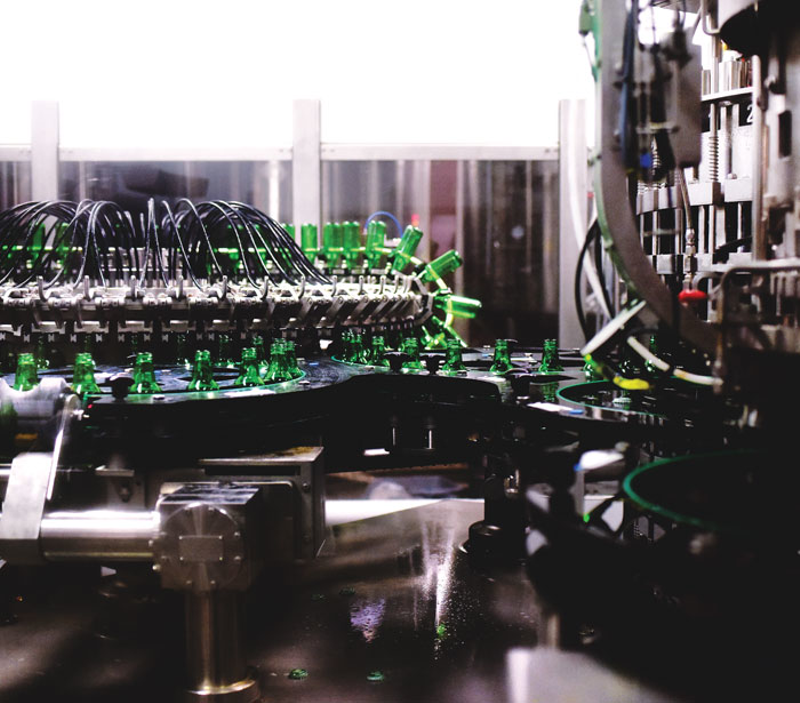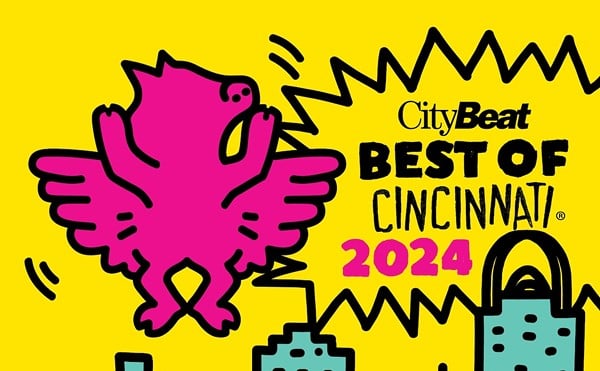Founded in 1958, the story of Little Kings represents only a sliver of Cincinnati’s more than 200-year beer history, but its legacy is a long and complex one.
Cincinnati’s brewing business boomed from the 1800s until Prohibition in 1920, when many long-running breweries, bars and saloons shuttered. But Hudepohl Brewing Company, founded in 1885, hung in there by making soft drinks and “near beer,” and when Cincinnati rebounded after the repeal of Prohibition in 1933, Hudepohl became the city’s dominant brewer. In 1986, after 100 years in business, Hudepohl was sold to local Schoenling Brewing Company, the maker of Little Kings Cream Ale, to form the Hudepohl-Schoenling Brewing Company.
Little Kings and its distinctive 7-ounce green bottle were invented in the ’50s when patrons of Montgomery Inn didn’t want to purchase full-sized beers to pair with shots of whiskey. Rumor is that the draft system at the restaurant was broken and no one wanted to buy a big 12-ounce bottle of beer when they just wanted a chaser, so the Schoenlings started packaging their cream ale in smaller bottles.
“The story of Little Kings took off,” says Greg Hardman, who owns Christian Moerlein Brewing Co. and other Hudepohl-Schoenling beer brands, including Little Kings. “People loved it for the 7-ounce bottles. People loved it for the cream ale. They loved it because (of) the unique packaging.
“It was only in later years that I discovered the actual reason they matched the slightly sweet cream ale with the bourbon is because they go (together) extremely well.”
Cream ale is one of three truly American-made beers, along with lager and California Common (steam beer). The top-fermented ale had been popular from before Prohibition up until the 1980s. In 1982, Little Kings accounted for 85 percent of Schoenling sales, and the brewery was selling about 8 million cases a year. In 1985, their tagline was, “It’s too good to be beer.” And you can still see a ghost sign from those glory days featuring Little Kings mascot, King Brewno — “He’s beer royalty,” Hardman says — lingering on the side of a building near Central Parkway in the West End.
Cream ale fell out of favor in the ’90s until the craft beer revival, when microbrewers started bringing it back.
In 1997, Hudepohl-Schoenling and all of its associated brands, including Christian Moerlein, were sold to the locally based Boston Beer Company, makers of Sam Adams. In 1999, Cleveland’s Snyder International Beverage Group bought Little Kings and produced the beer out of the Sam Adams brewery on Central Parkway until 2001, when it decided not to renew their agreement and moved production out of state.
“The owners were out of Cleveland, where they used to have a brewery, but their only brewery remaining was one in Frederick, Md., and they brewed all of the Hudepohl-Schoenling brands, including Little Kings,” Hardman says.
After a five-year stint in Maryland, the beer moved to Wilkes-Barre, Pa.’s Lion Brewery, only one of two breweries in the nation that could manufacture Little Kings’ iconic 7-ounce bottles.
Hardman played an integral role in bringing Little Kings production back to Cincinnati and also in reclaiming a big piece of the Queen City’s brewery history. In 2004, he bought the Christian Moerlein brand back and brought it home.
And then in 2006, he purchased all of the remaining Hudepohl-Schoenling brands, including Burger and Little Kings, with the intent of bringing production back to Cincinnati. People have been asking him to bring back Little Kings ever since, but he didn’t have the resources — production remained in Pennsylvania until this year, when Hardman brought it back. He had to install a special bottle-filling machine in the Moerlein brewery to accommodate the 7-ounce bottles, but the first full run of Little Kings produced locally in more than 15 years came down the Moerlein conveyor belt in April.
Today, Little Kings is sold in 20 states and has a huge following in Chicago and Denver. In Cincinnati, you can find bottles at Dunlap Café and MOTR in OTR, Arnold’s downtown and at liquor stores. And at one point, Little Kings was sold in 40- and 64-ounce bottles, but Hardman is only producing the 7-ounce bottles, including a package called The Cube — a 16-pack of 7-ounce beers.
Little Kings is embedded in the fabric of this city’s history. There’s a sense of nostalgia surrounding the brand that even Hardman touches on, remembering what it was like to drink Little Kings in his younger years.
“Every sip you took was cold, because the bottles were only 7-ounces and you only needed three or four sips and you were through Little Kings,” he says. “I enjoyed it because of the slight sweetness that cream ale provided and the drinkability of it.”
He also recalls the story of a legendary barfly around town, touching on the larger-than-life legacy of the brand. The guy would bet that he could drink a whole Little Kings without using his hands whatsoever. “I’d seen this guy win this bar bet literally 10 times,” Hardman says. “It’s quite amazing.”
Along with the memories and legacy, Hardman is glad to finally have Cincinnati’s great and historic beer brands back together again, especially Little Kings.
“It shouldn’t have left Cincinnati in the first place,” Hardman says. “We’re really proud that we’re able to rescue a city’s heritage beer brand and bring them back to life locally. We’re the only craft brewery in the nation that has done it so extensively.” ©






